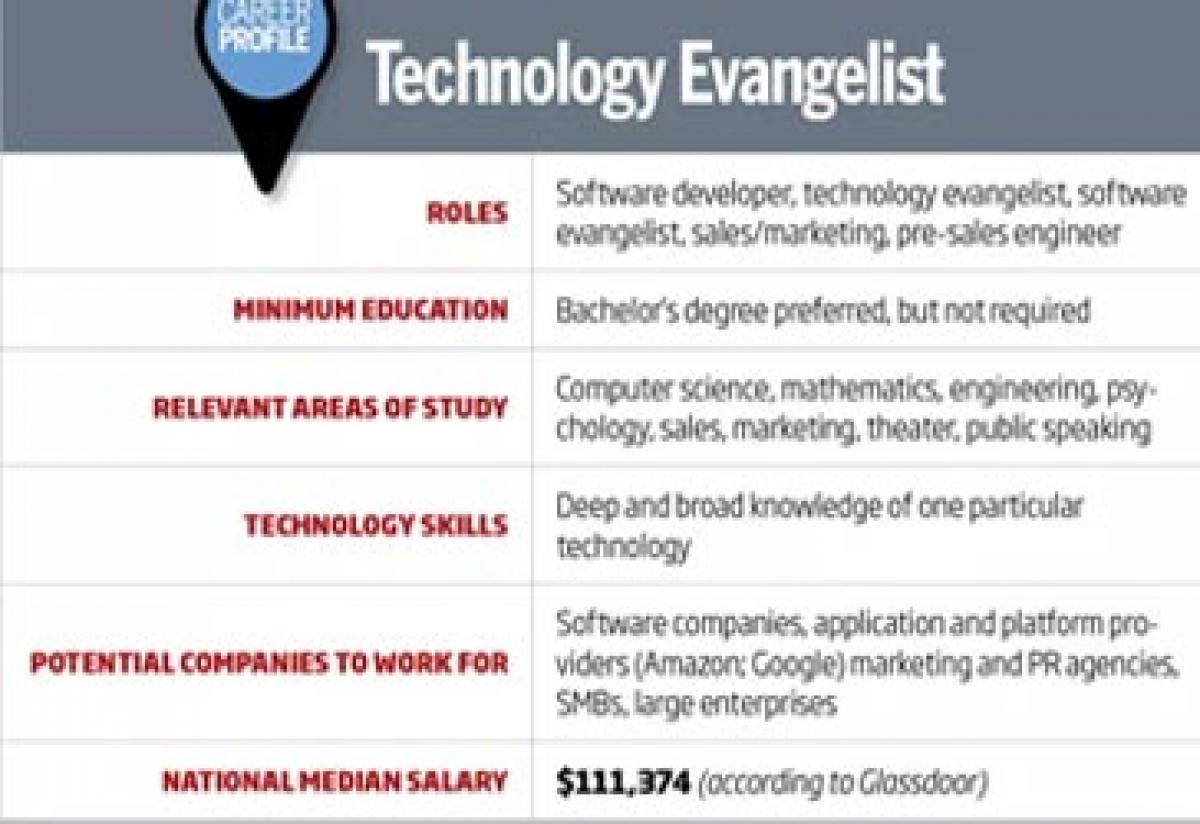A career as technology evangelist: Your roadmap to clinch IT job.

At one point in his life, Michael Sage was a monk living in a monastery. Nowadays, though, he practices a different kind of evangelism in his job as a chief evangelist at BlazeMeter, a software load and performance-testing company.
Do you love technology? Is there a programming language, platform or application you can't stop talking about? Perhaps a career as a technology evangelist is in your future.
At one point in his life, Michael Sage was a monk living in a monastery. Nowadays, though, he practices a different kind of evangelism in his job as a chief evangelist at BlazeMeter, a software load and performance-testing company.
You may have heard the term "evangelist," or even have such a role in your own company. The role is becoming increasingly important in a technology-driven economy where applications, software and Web platforms all compete for users' attention, says Michael Doonan, a partner at executive search firm SPMB.
"Specifically in technology, the evangelist role is becoming much more important. Imagine if you're a platform-as-a-service startup, and you come into the market with a platform on which applications can be built, or software or services delivered, that removes the need for companies to develop their own internal, proprietary platform. Small companies, like startups, will take you up on that because it's cheap, it's easy and it's flexible. But part of the problem is growth and scale -- how can you move up-market into larger enterprises and get that customers base? That's where evangelism comes in," Doonan says.Becoming an advocate
By definition, an evangelist is someone who advocates for the use of a specific technology, and then elevates it as a standard within the industry, Doonan says. The earliest technology evangelists were high-profile names in the tech industry like Apple's Guy Kawasaki and even Steve Jobs.
The role itself is an interesting mix of technology, sales, marketing and even a bit of psychology and theatrics, says Sage. You not only need the technical chops to demonstrate what technology can do, but you need to be able to sell others on ways it could help them in their jobs or in their day-to-day life, he says.
"You're drawing on aspects of a bunch of different fields, technology, sales, marketing, psychology, even acting. You not only have to have technical depth and credibility, but also polished sales and marketing skills so that you can handle objections, you can promote messaging in a non-threatening way. And you have to know a lot about the business climate you're operating in -- what's the market like? What are the circumstances that have brought a company to where it is?" Sage says.
There's no one right educational path to becoming an evangelist, says Heidi Ellis, professor and chair of Computer Science and Information Technology at Western New England University. The role involves such a unique combination of skills that educational background could be anything from computer science to marketing and sales.
"You need enough hard-core technical background to speak reasonably about the technology, but it's just as important to speak well, and have great communication skills. I'd also say that business-focused people who know a lot about the inner workings and culture of a company that developed that technology could do extremely well in a role like this," Ellis says.
Technology takes center stage
Sage himself is a self-taught programmer who also dabbled in theater during his college years, a skill that, at first, doesn't seem like it would be relevant in a technical field, but which he relies on every day.
"Sometimes I think I should have gone to acting school. I love being in front of people, getting into 'performance mode,' and I get to combine those skills with my tech skills. But it's more than just acting -- I also have to be credible, and speak the same language as programmers, engineers and the technical decision makers and buyers. I have to be able to go in and get developers and engineers excited about certain tools or technology in a language they understand," Sage says.
He sees some of the same interpersonal skills in roles like product managers, technical sales reps, pre-sales engineers, and even some CIOs. In fact, many CIOs find themselves acting as technology evangelists to their fellow executives, helping to explain how and why certain technologies work well -- or don't -- within their IT and software organizations, says Doonan.
"When you get to the enterprise level, those companies tend to move more slowly and they're more cautious. They don't want to be the first to try out new technology and then fail; that could be a disaster. Instead, many CIOs are reaching out to their peers to say, 'Hey, I'm thinking of integrating such-and-such software suite' or 'What happened when you moved to X, Y, Z platform?' and then relying on that advice to move forward," Doonan says.
There are a number of different paths that could lead to a career as an evangelist, Sage says. He's seen people in the role with backgrounds in product marketing, traditional sales and hard-core technologists. Regardless of where evangelists come from, there are some skills that are necessary, he says.
"You have to have the tech skills; people will know if you're faking that. You have to cultivate some performance and public-speaking skills. I'm not going to say everyone should go out and get a vocal coach, but it's not going to hurt you to have showmanship skills. Excellent communication, writing, networking skills are all critical to this role," Sage says.
A specialized role
Most technology evangelists do specialize in one or two specific technologies, whether it's programming languages, software suites, Web platforms or other technologies, Sage says. Being a generalist in this role tends to dilute the message you're trying to send, and it can negatively impact your credibility, too.
"I think you do have to specialize, because that's what separates the good from the great. If you don't know the tech or the market inside, outside and upside down, you're not going to get the right message across, and you'll look shady and untrustworthy," he says.
Evangelists, much like sales and marketing professionals, tend to have a certain personality type, too, according to Sage. They're extroverted, they're not shy or anxious, and they love being with other people -- or on stage in front of an audience.
"If you're considering a role like this, you have to ask yourself honestly, 'Will I be comfortable?' If you're quiet, shy and anxious, it's going to be so much harder for you to get up in front of an audience, or make presentations to groups of engineers -- you've got to have the right kind of personality for it," he says.
Even at the CIO level, interpersonal communication and marketing skills are key, especially if you're advising other CIOs and peers on technology, says Doonan. "CIOs don't want to be sold, they want to have solutions 'recommended.' The challenge, especially if you're the CIO of a technology or software company who's trying to get others to use your stuff, is getting the tone and the approach right. This is a 'salesperson in sheep's clothing' kind of situation -- CIOs don't want someone banging on their door, they want someone to say, 'I've used this, here's my experience, here's why I think it'll work for you, too,'" Doonan says.
If you're considering a role as an evangelist, Sage has some simple advice he gleaned from his theater days: practice, practice, practice.
"Pick a technology you love, and give everyone you know demos of it. I remember, in 2004 when I was working at Hewlett-Packard, I got my first MacBook. I just fell in love with that thing, and I could not stop talking about it -- at work, at home, I showed everyone. And then, one day, a guy I worked with made a snide comment about how effectively I was evangelizing this product, and it just clicked. That's what we do, as evangelists, we embody the passion and the positivity that comes with 'selling' a great product," he says.










